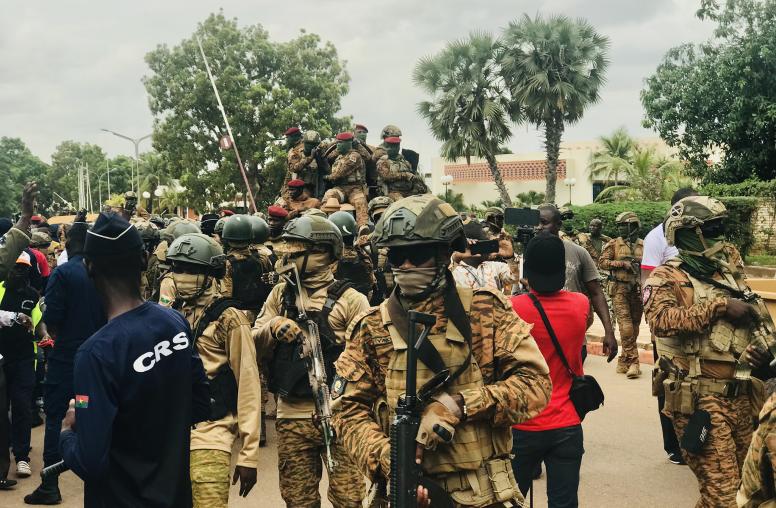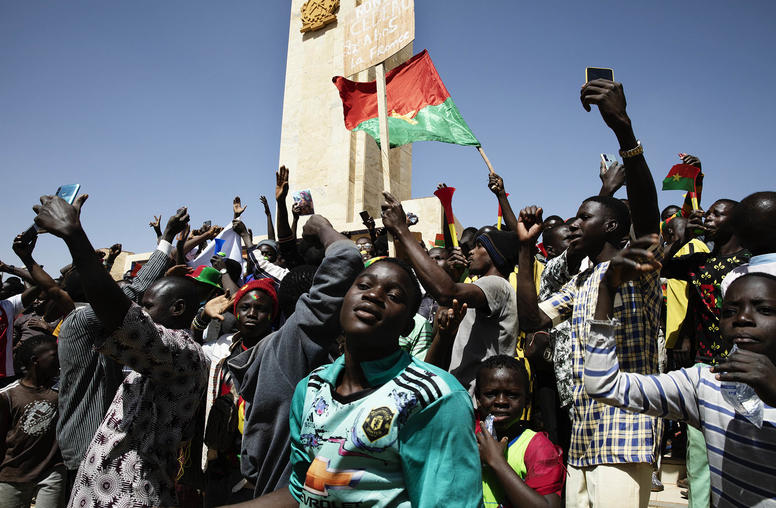How to Respond to Niger’s Coup — and Prevent the Next One
One key step: Urgently bolster degraded democratic institutions in coup-vulnerable countries.
Military officers in Niger are rushing to consolidate the power they seized 15 days ago, while West Africa’s elected governments and regional institutions are seeking ways to reverse the July 27 coup d’état. Niger’s coup seems a particular setback for democracy, completing a six-nation belt of military regimes across Africa’s Sahel region. Amid this uncertain power struggle, how can the world support Africans’ demonstrated demand for elected, democratic governance that meets their peoples’ needs? We should begin by hewing to several basic principles. One is to keep our responses to coups coherent — but not uniform. Niger’s coup is distinct; our response must be as well.

The coup’s leader claimed justification for toppling Niger’s elected government by declaring that it “has not brought security” against insurgents. The junta suppressed civilian protests while promoting public demonstrations of support, pretending that flag-waving by crowds of frustrated youth represents a legitimation of their seizure of power. Niger’s coup is in some ways more egregious and dangerous than the seven previous coups since 2020 across the Sahel. Africans and their supporters will need to respond to it more intently.
The Root Problem: Hollow Democracies
An improved African, U.S. and international response must focus partly beyond Niger or the Sahel. We must urgently strengthen dangerously weak democratic institutions in many countries to prevent the further coups that loom, predictable, on the horizon. In too many countries, years of authoritarian rule by elected leaders or small elites have been allowed to debilitate political parties, hollow out judicial systems, constrict independent news media and restrict the free functioning of civil society. These degradations of democracy (1) erode governments’ abilities to respond to their people’s needs and grievances, (2) undermine the legitimacy of the state, and (3) ironically annihilate the democratic defenses that are supposed to protect elected leaders. As a result, they invite violent eruptions, whether extremism, insurgencies or coups d’etat. The coup risks confront both civilian-governed countries and those already under military rule.
Some African political leaders who fear coups have gone “on offense” to protect themselves, shuffling military leaders or forces to keep them too divided to seize power. Some analysts, and an aide to Niger’s President Mohamed Bazoum cited by The New York Times, say Bazoum was using this approach when he was overthrown. Leaders should instead prioritize building democracy’s defenses — such as political parties, the judiciary, media and civil society. By bolstering such institutions — and creating an environment of respect for accountability and the rule of law, governments can draw greater trade and investment. For their part, the United States and other international partners must increase that commercial and financial support. In this way, countries facing coup risks can build economic opportunities for their people, thus addressing the governmental and economic roots of instability, rather than their symptoms.
Alongside the local failures of democratic governance, internationally backed stabilization efforts in the Sahel (and elsewhere) also have erred in treating symptoms of the problem (for example, focusing too narrowly on building up military or police forces to fight extremists or insurgents) without addressing the underlying decay of democratic governance and institutions. Thus the United States and Africans’ other international partners must make long-term changes in policies and programs — a need underscored by Niger’s coup.
Such long-term improvements to better support democratization will be advanced by the implementation, underway, of America’s bipartisan Global Fragility Act, which focuses heavily in Africa. Still, alongside long-term reforms, the United States and its partners need a more focused, sophisticated response to coups d’état and the juntas that commit them.
Niger’s Dangerous Drama
The past week’s news headlines reflect a turbulent drama in Niger. On August 3, President Bazoum managed, from his house arrest, to publish a column in The Washington Post condemning the coup and its disastrous implications for 25 million Nigeriens, plus African and international interests in peace and democracy. The Economic Community of West African States (ECOWAS) froze commercial and financial transactions with Niger, crimping its trade. And ECOWAS declared its readiness to militarily force General Abdourahmane Tchiani and his junta to hand power back to Bazoum.
Acting Deputy Secretary of State Victoria Nuland flew to Niger’s capital, meeting officers of the junta (although not Tchiani) to urge that they restore Bazoum to power. Nuland told reporters that the United States, which has 1,100 troops based in Niger for Sahel counterterrorism operations, “was offering its good offices if there is a desire on the part of the people who are responsible for this to return to the constitutional order.” She added, “I would not say that we were in any way taken up on that offer.”
Hours later, the junta barred a delegation from the United Nations, African Union and ECOWAS from entering Niger, claiming that “anger and revolt among the population” against ECOWAS’ sanctions made it impossible to guarantee the envoys’ safety. Effectively, Tchiani and his junta are racing to consolidate power while holding off any mediation efforts that would push them to relinquish it. They named a Nigerien economist and former finance minister as a civilian prime minister of their government and announced promotions of fellow officers. They remained silent on any plans for a transition back to civilian rule.
Responding to the Coup
A first, do-no-harm principle in responding to Niger’s coup must be to avoid the catastrophe of a military intervention, a threat raised immediately after the coup by ECOWAS. Restoring elected civilian rule in Niger will need to use diplomacy, economic and political pressures that will require time to work. As we work toward that goal, Africans and their partners must press upon the coup leaders an immediate imperative: to respect the human rights of Nigeriens and free President Bazoum and his family, healthy and safe.
All coups must be reversed — but not all in the same way.
While no military putsch is acceptable, realism and statecraft require that we tailor our responses to each case. Niger’s coup is triggering a response beyond the condemnations and sanctions applied to recent Sahel coups. One reason is simply the extension of the dangerous pattern; Niger’s coup ousted the Sahel’s most internationally engaged civilian government. And it turns the Sahel into the world’s largest contiguous region of military rule, which repeatedly has proven likely only to exacerbate the underlying causes of the Sahel’s insurgencies and violent extremism.
Also vital is the context: While military rule is always illegal and unrealistic, it is not always equally venal or corrupt. While soldiers in Burkina Faso seized power last September in an illegal bid to halt a steady spread of extremist violence and insurgency, General Tchiani’s coup interrupts Nigeriens’ recent, gradual improvements in security and the economy. While Tchiani cited national insecurity as his justification for his attack, news accounts report that President Bazoum had been planning to remove Tchiani from his command over the presidential guard.
The United States could be a key enabler of a negotiated outcome.
The junta’s willingness to talk with a senior U.S. envoy, and the presence of U.S. forces in Niger (which the Defense Department says have “paused” their counterterrorism operations) appears likely to offer the United States a chance to support negotiations among the junta, neighboring states and ECOWAS. After her talks in Niamey, Nuland said the U.S. government will continue to offer that. Any mediation effort should engage traditional and religious leaders from around the Sahel, who are respected figures and who have taken steps to address the crisis.
Partners should work with ECOWAS and the African Union (AU) on effective steps in which the international community can fully support Africans’ leadership.
This includes avoiding military action that could worsen the crisis and shaping sanctions in ways to reduce suffering within the general population. The United States and international partners should sustain humanitarian aid, even as they respect ECOWAS sanctions freezing Niger government bank assets, halting trade, and preventing travel by coup leaders and their families.
Engage civilian and military governments alike to create conditions for restoring democratic governance.
The military governments in Burkina Faso and Mali vowed support for Niger’s coup. African and international diplomacy should apply pressure and persuasion to show them and other juntas that support for others’ coups will only deepen their own complications and isolation within the West African and international communities.
In Niger and elsewhere, support Africans’ yearning for democracy that works.
Africans consistently demand a future of effective democratic governance (that is, governance that responds to popular needs) — and not unelected, military rule. Credible democratic voices in Niger, the Sahel and Africa — especially in Francophone Africa — must reinforce public consensus that democratic governance is critical for economic development and security. Africa’s democracy activists must seek creative ways to sustain and build Africans’ pro-democracy consensus. Past movements such as Le Balai Citoyen (“Citizen’s Broom”) in Burkina Faso and Y’en a Marre (“Fed Up”) in Senegal show the capacity in Sahel states for grassroots activism to play important roles in defending constitutional order in the face of threats. To be most effective, U.S. or international support for such citizens’ movements should focus not against the junta but for democratic governance. Western governments often miss this important nuance: When they declare what they are for, their message is easier for Africans to accept and harder for foes to derail, than when they focus their messaging on what they are against.



